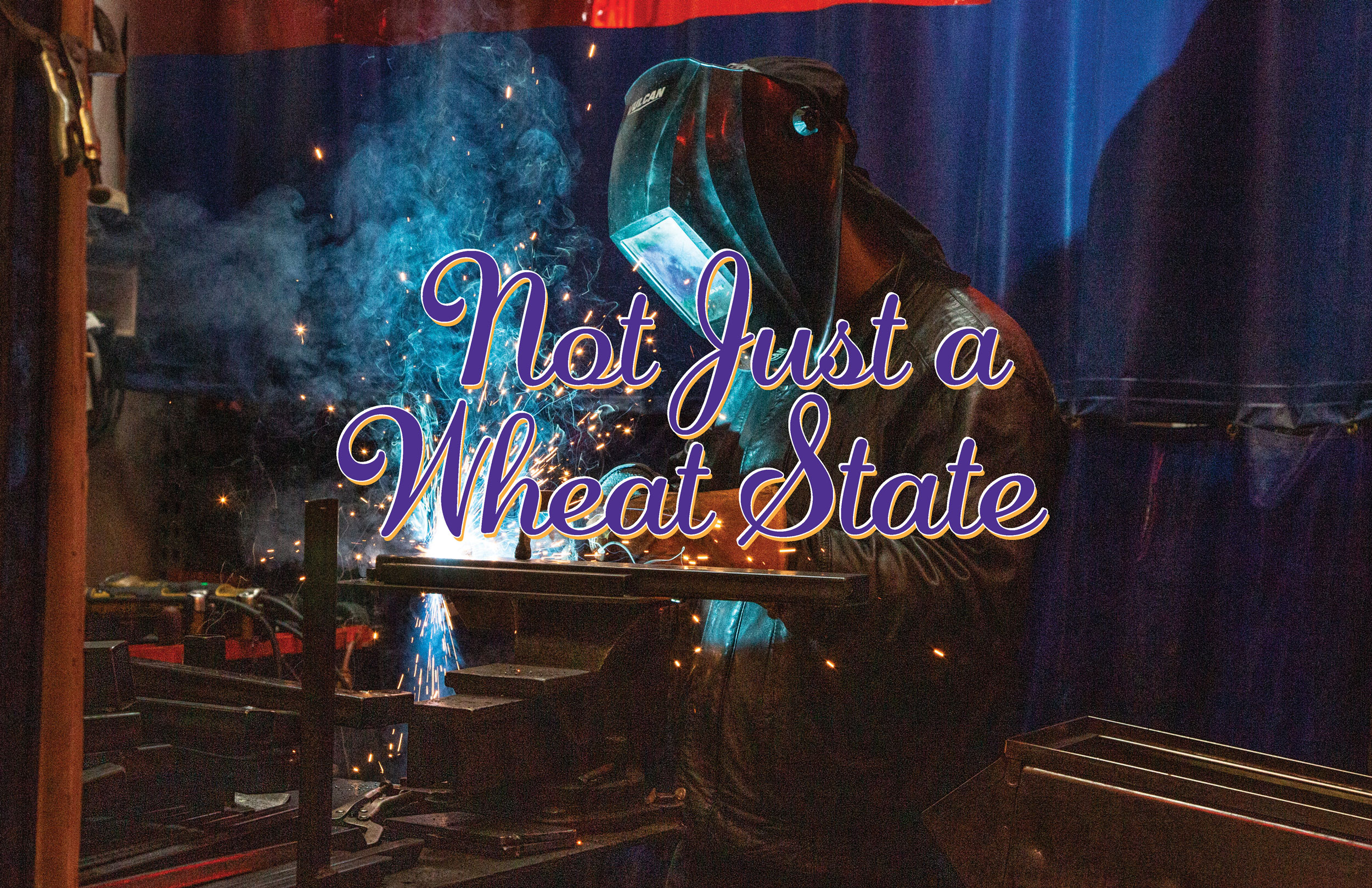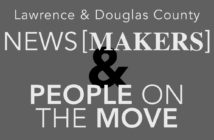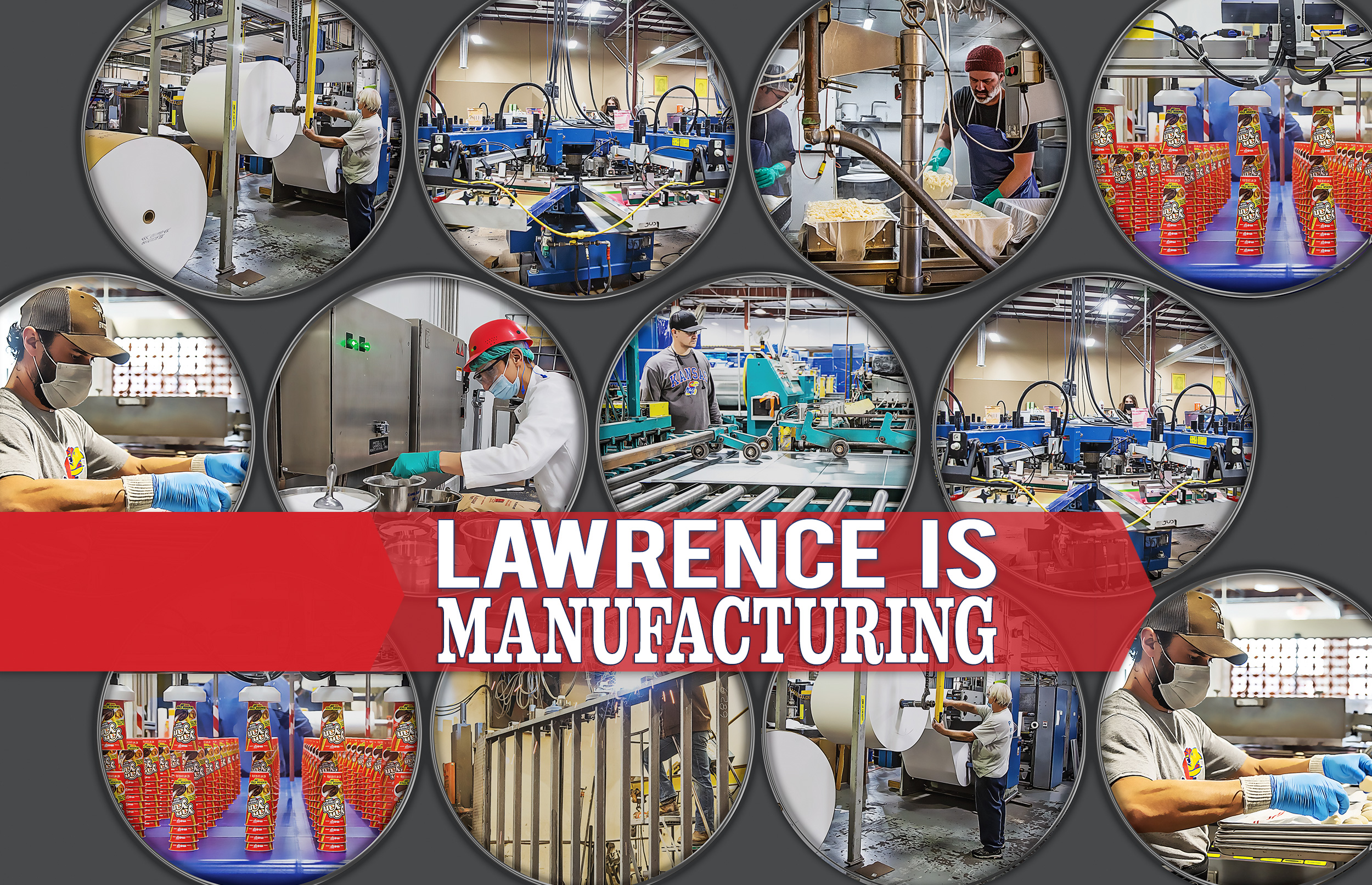| story by | |
| photos by | Steven Hertzog |
| OPEN A PDF OF THE ARTICLE |
Kansas is not just about agriculture. Right here in Lawrence, local industrial companies manufacture cutting-edge products for industries all across the board.

Marshall Sheetz, a certified weld inspector at Leander, uses the mig welder.
The importance of manufacturing in the United States cannot be understated. A community with a strong manufacturing base benefits from increased research and development, exploration of innovative ideas, improved processes and productivity, and creation of new products and jobs. Manufacturing helps raise the standard of living and, most importantly, fuels the U.S. economy.
According to the Kansas Department of Commerce, products created by Kansas manufacturers range from fuselages to food and chemicals to computer electronics. And these pursuits all have a common thread: the use of the most advanced techniques and innovative materials.
Kansas Manufacturing Solutions’ 2021 Manufacturing in Kansas Annual Report states that Kansas is home to more than 2,500 manufacturing firms. The manufacturing sector contributes to local economies in Kansas in a number of ways: providing wages to local workers; creating profits for local business owners and investors; and paying taxes to local and state governments.
In 2020, Kansas was the transportation origin for $10.4 billion worth of merchandise exports, including agricultural commodities, raw materials and manufactured goods, the report says. Manufactured goods accounted for 79 percent of the state’s total exports. With $8.26 billion worth of manufactured exports in 2020, Kansas ranked 32nd
among all states on this measure.
Located in the center of the United States, Kansas produces a fifth of all the wheat grown in the nation. But agriculture isn’t the only major manufacturing industry located in “America’s Breadbasket.” Lawrence, in particular, has a number of manufacturers that create cutting-edge products while benefiting from the resources this community has to offer.

Greg Summers, Leander President, demonstrates the table’s lumbar drop feature. Top to bottom: Production associate, Theron Dawson is working on the sub assembly for the lumbar frame section of the flexion distraction table.; Production associate, Shadow Spooner runs quality control procedures on the wiring harnesses; Marshall Sheetz uses the anti-spatter tools to fabricate the cervical head frames for the tables
Easing the Pain
“It’s always an advantage to being in a community of educated and motivated people with flexible minds,” says Greg Summers, president of Leander LLC, a leading manufacturer of Flexion-Distraction tables, a segmented medical table in use worldwide that flexes to move the lower spine to provide a gentle, safe, controlled form of traction for spinal pain relief. Chiropractors, physical therapists and orthopedic doctors around the world use these tables to treat their patients.
He says the company has benefited from University of Kansas (KU) student interns and input from the KU Small Business Development Center. He also appreciates the Dwayne Peaslee Technical Training Center (Peaslee Tech) programs and looks forward to long relationships with local organizations of higher learning and professional training.
The motorized Flexion-Distraction table was developed by Leander Eckhard, D.C., in 1981. Flexion-Distraction is a time-tested and research-proven lower-back-pain treatment that also assists in chiropractic adjustment. Summers explains that founder Eckard was an aviation hobbyist who incorporated many aircraft-grade parts on his prototype table that are still the best components to use to this day because of their aerospace-grade quality control to ensure longevity and safety.
“Our company has continued to make many innovations and improvements to our chiropractic tables over our 40-year history,” he says. “The table is designed for doctors to work comfortably with custom variable height and work longer without exhaustion thanks to motorized treatment assistance.”
Summers bought Leander in the summer of 2020. He previously worked as the human resources director for a regional CPA firm but had no manufacturing experience.
He sought out the best advice he could find and worked shoulder to shoulder with consultants like Kansas Manufacturing Solutions to learn the business hands-on.
Leander currently has a team of 12 but is growing and actively hiring. “Building the right team and supporting them is the most important thing in American manufacturing,” he says. “Since it’s a small team, we all work together and communicate all day every day. I do my best to be a business owner first and focus on the planned projects, but (with) the types of issues the pandemic has caused in the supply chain and labor shortages, it often comes down to putting out fires and doing whatever is needed.”
Industry shutdowns in 2020 worldwide because of the rapid spread of COVID-19 created lower consumer demand and reduced industrial activity, according to an October 2021 CNBC article on the supply chain. Demand has skyrocketed since lockdowns have been lifted, but worker shortages and a lack of key components and raw materials has led to chaos for manufacturers and distributors.
Summers believes safety and quality control are key components when it comes to being a successful manufacturer. “Safety is the top priority in every production process; there just isn’t a single benefit to not taking the time to do things the right way and the safe way.” He says the company has moved into a new factory that has dramatically better lighting, ventilation, flow and modern safety and fire-suppression systems in place with OSHA (Occupational Safety and Health Administration)-trained safety officers as departmental leads.
“Quality control is also key in production, and it isn’t just a check list postproduction,” Summers adds. “It starts at the first step in making every part. This reduces waste and, ultimately, speeds production times.”
Summers considers Leander the best of both a large company and a small business. Its small, family-like team cares about and supports one another and the community. “I purchased Leander not because of what it is but what we can make it into, and I love this city not only for what it is but what we can make it,” he says.

The P1 Sheet Metal Fabrication Shop is home to an Iowa Precision Coil Line. It used to take about 15 minutes
to produce one piece of duct. With the coil line, we can manufacture pieces at a rate of 30 seconds per piece. Top to bottom: P1 Group majority owners CEO Smitty Belcher and COO Bruce Belcher; Spiral Helix duct; The Sheet Metal Fabrication Shop is also home to a Spiral Helix machine, which will allow the shop to produce
All in One
With headquarters in Lenexa and a fabrication facility in Lawrence, P1 Group has the advantage many businesses seek in the U.S., and that’s a central location. What started as a local business has grown into a larger business based in a small town. “However, we will always be a local business supporting this community,” says Smitty Belcher, P1 Group CEO since 1997.
Belcher purchased Huxtable & Associates, which later merged with A.D. Jacobson Co. in 1997, officially consolidating into P1 Group in 2007. He “saw an opportunity for several high-quality providers of specific facility solutions to come together as one, creating a powerful collection of expertise,” Belcher recalls. “This meant more customers could be served under one roof, increasing efficiency and cost savings for all.”
P1 provides one source for all things facilities. From construction through service, P1 supports projects throughout the entire course of a facility’s life cycle. The company specializes in HVAC, mechanical, electrical, plumbing, millwright and architectural metal work.
With a state-of-the-art 220,000-square-foot fabrication facility in Lawrence, P1 can fabricate all trades and provides value-added services such as virtual design and construction (building information modeling); performance solutions; preventative maintenance; facility maintenance operations; performance contracting and master planning; design-build; and value engineering.
“P1 does a lot of our work in environments that meet different definitions of ‘critical,’ from mission critical, highly sensitive data centers to hospitals where the operations of the building are critical to the health and well-being of those that use them,” Belcher explains. “For this reason, we stay on the cutting edge of training our associates and new technologies in our fabrication shop.”
Some P1 projects, both local and national, include: The KU Earth, Energy and Environment Center; Kansas City Children’s Mercy Hospital Research Institute’s tower; and the Los Angeles County-University of Southern California Restorative Care Village.
Being located in Lawrence, however, has given P1 Group the opportunity to build long-term relationships with large customers like the University of Kansas, LMH Health, Hallmark and Berry Global. “The convenience of working with these customers in their own backyard is mutually beneficial to both of us,” Belcher explains.
P1 Group sees safety as not only its No. 1 priority but a core value. “Safety is an integral part of the P1 Group culture, starting with a highly effective full-time safety staff,” he says. The company “takes an up-front and hands-on approach to managing a safe workplace. Every new employee starts, Day 1, with an in-house safety orientation that covers our policies and expectations.”
The P1 safety department does random audits of its job sites and has open communication between field staff, management and safety professionals, beginning with the preconstruction meeting and continuing throughout the duration of the project. It is a member of the Build Safe Partnership, meaning the company has adhered to a strict set of OSHA guidelines. “Only 21 companies in the region participate in Build Safe, and P1 Group is on that exclusive list,” Belcher adds.
P1 also has a quality-control plan that is a dynamic process frequently reviewed, monitored and executed in strict compliance with design drawings, specifications and contract documents.
About 70 percent of P1’s work is within the Lawrence/Kansas City metropolitan area, but P1 will always be a local contractor. “There is a nice connection when we work with local customers in Lawrence,” Belcher explains. “… there’s a hometown pride that comes with working together. P1, as an organization, is an avid supporter of all things Lawrence. Our deep history of not only working for some of Lawrence’s largest institutions but also philanthropic support of these institutions sets us apart from any competitors in the area.”

Plastikon’s newest production cell producing terminally sterilized irrigation solutions. Plastikon process technician inspecting clarity on an injection molded petri dish at line start-up
Innovative Packaging
Plastikon Healthcare provides innovative solutions for contract manufacturing and packaging of medical devices, pharmaceutical products and nutritional supplements.
Originally, the company was formed to provide Class 2 IVD (in-vitro diagnosis) medical devices, explains Kaveh Soofer, executive vice president and son of the founder. It produces 22 million of this device a year with plans for growth into additional product lines.
“The concept was to move from medical device to pharma, [and]we needed to establish our business in the area,” he says. Since then, Plastikon has added component medical devices and over-the-counter drug products (single-dose liquids and suspensions in a cup format for use in hospitals and nursing homes). It has also moved into irrigation large-volume pharmaceuticals. “With our growth and expansion, we were able to support the U.S. COVID responses, producing up to 11 million COVID sample collections tubes per week,” Soofer continues.
These medical-device products are important, he explains, because they “support diagnostic testing at hospitals for diagnosing diseases. Our drug products that are private-labeled by other organizations/companies are used to manage symptoms from colds to intestinal discomfort.”
Plastikon not only formulates the medical device or drug solution, it also makes the primary container that houses that drug solution(s), Soofer explains. “Through friction and heat, we melt the resin to create the ampules and bottles.” The company uses BFS (Blow-Fill-Seal), an automated manufacturing process that melts the resin, forms the bottle, and fills and seals the bottle in one unique step.
Plastikon has 100 employees and prides itself on the internal growth of employees and providing economic stability for individuals and families as they grow within the organization, he says.
Its clients are large- and medium-sized pharmaceutical and medical-device companies that need contract manufacturing performed due to capacity restraints or technology limitations at their own sites, Soofer explains. “We also provide small businesses with the opportunity to get into the market with a product they have innovated or designed.”
When it comes to safety, Plastikon employs extensive training programs and procedures for all aspects of the business. “Safety and quality control are part of good manufacturing practices and built into our quality systems,” he says. Every procedure includes a safety section specific to the activity with a system designed to ensure employee compliance. “Product quality is built into all our processes with lab control checks and quality-assurance review, and approval of final product and processes,” he adds.
Soofer explains the company is environmentally conscience and promotes good stewardship by assessing the impact of all waste cycles on the community. It also has programs in place that center around effective use of natural resources, such as water purified from a city source.
“Our company is built and ISO [International Organization for Standardization]-certified on a platform of continuous improvement,” he says. “Our equipment and processes are designed and purchased on strict user requirements for the latest technology and sustainability.”
Plastikon has partnerships with KU and Peaslee Tech, where it participates on the board as a manufacturing representative. Its employees have benefited from apprentice programs on industrial maintenance and soft skills at Peaslee Tech, and it has sponsored interns from KU.
Plastikon is a larger business based in a small town, Soofer adds, with no local sales but an abundant sourcing of local contractors and supplies. “We were happy to find and acquire the Lawrence location as part of the company’s growth,” he says. The home base being here provides easy access to freeways for distribution, higher education and city and county officials.
There are myriad forms of manufacturers across the globe, but if you’re looking for a unique or just a simple, everyday product, or even a manufacturer to help with one, look no further than right here in our own backyard.
![]()




